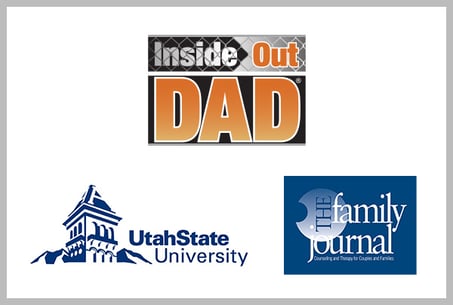What 713 Dads Say About InsideOut Dad® Provides Further Evidence for Its Effectiveness
4 min read
Date Published: 02/09/2021
Last Updated: 11/22/2024
National Fatherhood Initiative Blog / Latest Articles
4 min read

A study of 713 incarcerated dads by researchers at Utah State University says a lot about the effectiveness of National Fatherhood Initiative’s InsideOut Dad® program with incarcerated minority fathers.
Published in the peer-reviewed The Family Journal: Counseling and Therapy for Couples and Families, the researchers summarized the study in the following manner.
“Quantitative analyses indicated decreases in partner conflict among participants and more positive perceptions of subjective well-being. Qualitative analyses revealed that the program was positively received, with participants noting the skills they developed. As a result of fatherhood education, incarcerated minority fathers reported being empowered and more confident in their roles as fathers and that they learned needed skills to be responsible and responsive fathers. Such findings may inform facilitators of corrections-based parenting programs on best practices for serving incarcerated fathers from historically underserved groups.”
One of the reasons that this study is important is that few studies of fatherhood programs have examined the experiences of minority fathers, let alone minority incarcerated fathers. This study had two primary objectives:
Here’s what the researchers found from their quantitative analysis of the program.
The researchers concluded that:
“These results suggest that InsideOut Dad® can help incarcerated minority fathers improve their relationships with romantic partners and their perceptions of subjective well-being within the domains of psychological distress and social support. From a family systems perspective, these positive outcomes may spill over to other positive processes…and may eventually lead to positive impacts on father–child relations.”
Three themes emerged from the researchers’ qualitative analysis of the program: 1) the program’s effectiveness as expressed by dads’ experiences with the program and the knowledge and skill development they gained; 2) the quality of the facilitators; and 3) program improvements.
Program’s Effectiveness
The dads used the following adjectives to describe the program’s effectiveness in terms of their experiences: “excellent,” “informing, “life changing,” and “inspirational.” They also spoke about how the program challenged them toward self-improvement (e.g. as a dad).
One Native American dad summed up the program’s effectiveness by saying:
“After attending this program, I have regained the confidence I needed to be a good father to my 2-year-old son. I have learned the importance in having integrity and self-worth when fathering my son. I have also learned even further, the importance in love and honesty. I am truly confident in my new knowledge and new skills that I have learned and I am very excited to build a healthy relationship with my son and rebuilding the relationship with his mother.”
In terms of skill development, the dads spoke about gaining:
Facilitators’ Quality
In the Facilitator’s Manual for InsideOut Dad®, the following statement starts Chapter 3: “The InsideOut Dad®curriculum Is nothing more than paper and ink. It is only worth the space it takes up as it sits on the shelf. To be an effective agent for change, the program must be implemented by quality facilitators. As facilitators go, so goes the effectiveness of the program. The facilitator and the effectiveness of the program are inseparable.”
It’s clear that these facilitators brought the program alive and contributed greatly to its effectiveness. The dads spoke about how the facilitators “enriched their learning experience by explaining information thoroughly, showing genuine concern for participants, and providing encouragement.” They also used words like “charisma,” “energy,” and “sincerity” to describe facilitators.
Program Improvements
Regarding program improvements, the dads suggested “expanding the program,” “smaller class sizes,” “longer sessions,” and an “updated curriculum.” To that last suggestion, some dads suggested adding more content around relationships (e.g. coparenting) and finances.
The suggestions for improvement speak to one of the challenges users of InsideOut Dad® can encounter: limited time to complete the program. That can mean using fewer than the 12 core sessions and not running any of the six optional reentry sessions.
And that’s what happened in this case. Because of time constraints, the researchers used only five of the 12 two-hour core sessions. That they still found the program to have such positive outcomes speaks to the quality of the content, facilitators, and choice of sessions.
Nevertheless, facilitators should, if at all possible, use at least all core 12 sessions for maximum effectiveness. Released in 2018, the third edition of the program contains even more of the content on communication and finances the dads suggested it should have. We beefed up the core sessions to contain more content on communication and also added two new sessions on communication/coparenting to the optional reentry sessions. We added a session on finances to the reentry sessions as well. That’s why we encourage facilitators to use those reentry sessions should they find dads can benefit from them.
If you use InsideOut Dad® or have thought of adding it to your programming, the results of this study provide further evidence that it should be your program of choice for working with diverse incarcerated fathers.
Want to learn more about InsideOut Dad®? Click here.
Want to download a copy of the study? Click here.
Date Published: 02/09/2021
Last Updated: 11/22/2024
Download this free guide for a proven 7-step roadmap—from making the case and securing funding for your program, to launching and measuring real results!


Train Your Staff
Fatherhood Programs
Fatherhood Data
© 2026 National Fatherhood Initiative®. All rights reserved.